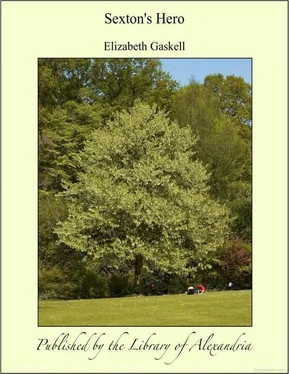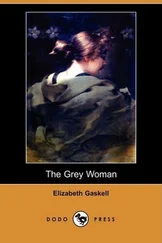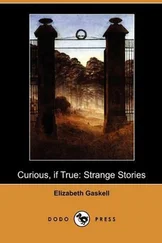Elizabeth Gaskell - The Sexton's Hero
Здесь есть возможность читать онлайн «Elizabeth Gaskell - The Sexton's Hero» весь текст электронной книги совершенно бесплатно (целиком полную версию без сокращений). В некоторых случаях можно слушать аудио, скачать через торрент в формате fb2 и присутствует краткое содержание. Год выпуска: 1932, ISBN: 1932, Издательство: Library of Alexandria, Жанр: Классическая проза, Старинная литература, на английском языке. Описание произведения, (предисловие) а так же отзывы посетителей доступны на портале библиотеки ЛибКат.
- Название:The Sexton's Hero
- Автор:
- Издательство:Library of Alexandria
- Жанр:
- Год:1932
- ISBN:9781465572257
- Рейтинг книги:3 / 5. Голосов: 1
-
Избранное:Добавить в избранное
- Отзывы:
-
Ваша оценка:
- 60
- 1
- 2
- 3
- 4
- 5
The Sexton's Hero: краткое содержание, описание и аннотация
Предлагаем к чтению аннотацию, описание, краткое содержание или предисловие (зависит от того, что написал сам автор книги «The Sexton's Hero»). Если вы не нашли необходимую информацию о книге — напишите в комментариях, мы постараемся отыскать её.
The Sexton's Hero — читать онлайн бесплатно полную книгу (весь текст) целиком
Ниже представлен текст книги, разбитый по страницам. Система сохранения места последней прочитанной страницы, позволяет с удобством читать онлайн бесплатно книгу «The Sexton's Hero», без необходимости каждый раз заново искать на чём Вы остановились. Поставьте закладку, и сможете в любой момент перейти на страницу, на которой закончили чтение.
Интервал:
Закладка:
The Sexton's Hero
by Elizabeth Gaskell
The afternoon sun shed down his glorious rays on the grassy churchyard, making the shadow cast by the old yew-tree under which we sat, seem deeper and deeper by contrast. The everlasting hum of myriads of summer insects made luxurious lullaby.
Of the view that lay beneath our gaze, I cannot speak adequately. The foreground was the grey-stone wall of the vicarage-garden; rich in the colouring made by innumerable lichens, ferns, ivy of most tender green and most delicate tracery, and the vivid scarlet of the crane’s — bill, which found a home in every nook and crevice — and at the summit of that old wall flaunted some unpruned tendrils of the vine, and long flower-laden branches of the climbing rose-tree, trained against the inner side. Beyond, lay meadow green, and mountain grey, and the blue dazzle of Morecambe Bay, as it sparkled between us and the more distant view.
For a while we were silent, living in sight and murmuring sound. Then Jeremy took up our conversation where, suddenly feeling weariness, as we saw that deep green shadowy resting-place, we had ceased speaking a quarter of an hour before.
It is one of the luxuries of holiday-time that thoughts are not rudely shaken from us by outward violence of hurry and busy impatience, but fall maturely from our lips in the sunny leisure of our days. The stock may be bad, but the fruit is ripe.
‘How would you then define a hero?’ I asked.
There was a long pause, and I had almost forgotten my question in watching a cloud-shadow floating over the far-away hills, when Jeremy made answer:
‘My idea of a hero is one who acts up to the highest idea of duty he has been able to form, no matter at what sacrifice. I think that by this definition, we may include all phases of character, even to the heroes of old, whose sole (and to us, low) idea of duty consisted in personal prowess.’
‘Then you would even admit the military heroes?’ asked I.
‘I would; with a certain kind of pity for the circumstances which had given them no higher ideas of duty. Still, if they sacrificed self to do what they sincerely believed to be right, I do not think I could deny them the title of hero.’
‘A poor, unchristian heroism, whose manifestation consists in injury to others!’ I said.
We were both startled by a third voice.
‘If I might make so bold, sir’ — and then the speaker stopped.
It was the Sexton, whom, when we first arrived, we had noticed, as an accessory to the scene, but whom we had forgotten, as much as though he were as inanimate as one of the moss-covered head-stones.
‘If I might be so bold,’ said he again, waiting leave to speak. Jeremy bowed in deference to his white, uncovered head. And so encouraged, he went on.
‘What that gentleman’ (alluding to my last speech) ‘has just now said, brings to my mind one who is dead and gone this many a year ago. I, may be, have not rightly understood your meaning, gentlemen, but as far as I could gather it, I think you’d both have given in to thinking poor Gilbert Dawson a hero. At any rate,’ said he, heaving a long quivering sigh, ‘I have reason to think him so.’
‘Will you take a seat, sir, and tell us about him?’ said Jeremy, standing up until the old man was seated. I confess I felt impatient at the interruption.
‘It will be forty-five year come Martinmas,’ said the Sexton, sitting down on a grassy mound at our feet, ‘since I finished my ‘prenticeship, and settled down at Lindal. You can see Lindal, sir, at evenings and mornings across the bay; a little to the right of Grange; at least, I used to see it, many a time and oft, afore my sight grew so dark: and I have spent many a quarter of an hour a-gazing at it far away, and thinking of the days I lived there, till the tears came so thick to my eyes, I could gaze no longer. I shall never look upon it again, either far-off or near, but you may see it, both ways, and a terrible bonny spot it is. In my young days, when I went to settle there, it was full of as wild a set of young fellows as ever were clapped eyes on; all for fighting, poaching, quarrelling, and such like work. I were startled myself when I first found what a set I were among, but soon I began to fall into their ways, and I ended by being as rough a chap as any on ’em. I’d been there a matter of two year, and were reckoned by most the cock of the village, when Gilbert Dawson, as I was speaking of, came to Lindal. He were about as strapping a chap as I was (I used to be six feet high, though now I’m so shrunk and doubled up), and, as we were like in the same trade (both used to prepare osiers and wood for the Liverpool coopers, who get a deal of stuff from the copses round the bay, sir) we were thrown together, and took mightily to each other. I put my best leg foremost to be equal with Gilbert, for I’d had some schooling, though since I’d been at Lindal I’d lost a good part of what I’d learnt; and I kept my rough ways out of sight for a time, I felt so ashamed of his getting to know them. But that did not last long. I began to think he fancied a girl I dearly loved, but who had always held off from me. Eh! but she was a pretty one in those days! There’s none like her, now. I think I see her going along the road with her dancing tread, and shaking back her long yellow curls, to give me or any other young fellow a saucy word; no wonder Gilbert was taken with her, for all he was grave, and she so merry and light. But I began to think she liked him again; and then my blood was all afire. I got to hate him for everything he did. Aforetime I had stood by, admiring to see him, how he leapt, and what a quoiter and cricketer he was. And now I ground my teeth with hatred whene’er he did a thing which caught Letty’s eye. I could read it in her look that she liked him, for all she held herself just as high with him as with all the rest. Lord God forgive me! how I hated that man.
He spoke as if the hatred were a thing of yesterday, so clear within his memory were shown the actions and feelings of his youth. And then he dropped his voice, and said:
‘Well! I began to look out to pick a quarrel with him, for my blood was up to fight him. If I beat him (and I were a rare boxer in those days), I thought Letty would cool towards him. So one evening at quoits (I’m sure I don’t know how or why, but large doings grow out of small words) I fell out with him, and challenged him to fight. I could see he were very wroth by his colour coming and going — and, as I said before, he were a fine active young fellow. But all at once he drew in, and said he would not fight. Such a yell as the Lindal lads, who were watching us, set up! I hear it yet. I could na’ help but feel sorry for him, to be so scorned, and I thought he’d not rightly taken my meaning, and I’d give him another chance; so I said it again, and dared him, as plain as words could speak, to fight out the quarrel. He told me then, he had no quarrel against me; that he might have said something to put me up; he did not know that he had, but that if he had, he asked pardon; but that he would not fight no-how.
‘I was so full of scorn at his cowardliness, that I was vexed I’d given him the second chance, and I joined in the yell that was set up, twice as bad as before. He stood it out, his teeth set, and looking very white, and when we were silent for want of breath, he said out loud, but in a hoarse voice, quite different from his own –
‘“I cannot fight, because I think it is wrong to quarrel, and use violence.”
‘Then he turned to go away; I were so beside myself with scorn and hate, that I called out, –
‘“Tell truth, lad, at least; if thou dare not fight, dunnot go and tell a lie about it. Mother’s moppet is afraid of a black eye, pretty dear. It shannot be hurt, but it munnot tell lies.”
Читать дальшеИнтервал:
Закладка:
Похожие книги на «The Sexton's Hero»
Представляем Вашему вниманию похожие книги на «The Sexton's Hero» списком для выбора. Мы отобрали схожую по названию и смыслу литературу в надежде предоставить читателям больше вариантов отыскать новые, интересные, ещё непрочитанные произведения.
Обсуждение, отзывы о книге «The Sexton's Hero» и просто собственные мнения читателей. Оставьте ваши комментарии, напишите, что Вы думаете о произведении, его смысле или главных героях. Укажите что конкретно понравилось, а что нет, и почему Вы так считаете.












